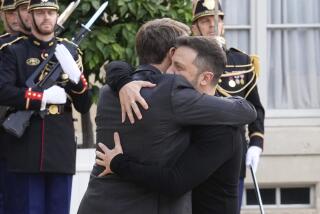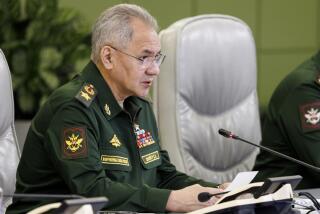Yeltsin Tries to Win Over France on NATO Issue
- Share via
MOSCOW — Employing the time-tested rule of divide and conquer, Russian President Boris N. Yeltsin on Sunday sought to woo France to the Kremlin’s side in a dispute over NATO expansion by praising French President Jacques Chirac’s discordant positions within the Western alliance.
Yeltsin, still recovering from quintuple heart bypass surgery and a bout of double pneumonia, looked frail in the brief footage shown on television of his meeting with Chirac, his first foreign visitor since his release from the hospital two weeks ago.
But accounts of the meeting provided by Yeltsin’s spokesman, Sergei V. Yastrzhembsky, suggested that the ailing president held up his end in what has become a full-scale Kremlin offensive to dissuade the North Atlantic Treaty Organization from expanding into Eastern Europe without heeding Russia’s concerns.
“Yeltsin is extremely satisfied with the results of the talks,” Yastrzhembsky told reporters after the Russian and French presidents discussed official business for 75 minutes. A luncheon kept the two leaders together for nearly two more hours.
“Russia’s and France’s positions coincide on many problems, particularly the problem of European security,” Yastrzhembsky said, quoting Yeltsin.
The mini-summit followed harsh warnings about NATO expansion from Kremlin officials taking part in the World Economic Forum in Davos, Switzerland, over the weekend.
Prime Minister Viktor S. Chernomyrdin conceded that Russia is powerless to veto NATO membership for countries that were once in Moscow’s orbit--Poland, Hungary and the Czech Republic are expected to be invited to join later this year--but warned of “the danger and fallacy of this step.”
“We have not felt any transformation of NATO so far as compared with the Cold War period when the bloc was established,” Chernomyrdin said, suggesting that the alliance is still hostile toward Moscow. “NATO has not shown any new goals, and the advance of this structure to the Russian borders will mean nothing good.”
France has voiced more support than other alliance members for the Kremlin’s demand for promises that expansion to Eastern Europe will not advance the West’s nuclear arsenal to Russia’s doorstep.
“I have become convinced that, if we try, we will be able to reach an agreement between Russia and NATO that would help create an architecture of European security,” Chirac told reporters.
*
Kremlin foreign policy advisors had said earlier that they would use Chirac’s meeting with Yeltsin to try “to tease the French away from the hard-line NATO camp,” the Interfax news agency reported, quoting an unnamed top official.
Paris and Washington have been sparring over command of NATO’s southern flank, with the French insisting that a European take over the headquarters post in Naples, Italy, traditionally occupied by an American officer.
France also has advocated conditions for extending alliance membership to Eastern European countries much more to Moscow’s liking than the vague and nonbinding assurances being offered by the United States and most other NATO allies.
Chirac acknowledged that his country “has no few differences of opinion” with other NATO members.
He visited Yeltsin at a rarely used government guest house outside Moscow--not far from the suburban Vnukovo airport where the French president’s plane landed and more convenient for the ailing Kremlin leader than his central offices and reception halls.
*
During his brief exchange with journalists after meeting Yeltsin, Chirac bristled at questions about whether the Russian president spoke clearly, walked unassisted and appeared to be fully in command of his senses.
“I am very impressed by his fast recovery after such a difficult operation,” Chirac said, cutting short other inquiries about Yeltsin’s health.
The Russian leader, who turned 66 on Saturday, has spent only 11 days in the Kremlin since his reelection to a new four-year term in July.
His absence and recurring illnesses have given ambitious opponents ammunition to portray Yeltsin as too ill and uninvolved to run the country.
Sunday’s television footage was unusual among the few public glimpses allowed of the Russian leader lately in that he was shown speaking to Chirac, slowly but audibly. Other tapes of Yeltsin edited and supplied by the Kremlin have contained no voice recording.
More to Read
Sign up for Essential California
The most important California stories and recommendations in your inbox every morning.
You may occasionally receive promotional content from the Los Angeles Times.














